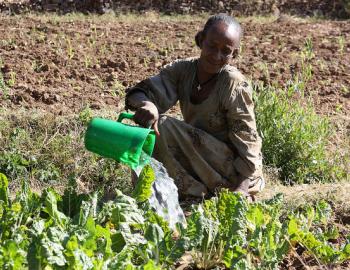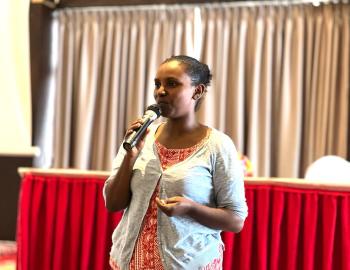Ethiopia Community of Practice for Gender Equality and Social Inclusion (GESI) in climate change
Ethiopia Community of Practice for Gender Equality and Social Inclusion (GESI) in climate change
Context
Ethiopia is highly committed to address the climate change challenge the world is facing and has been working to contribute towards the goals of the Paris Agreement. In the last 50 years, evidence of climate change impacts has become clear in Ethiopia. Ethiopia’s Nationally Determined Contribution (NDC) indicates that these conditions are expected to further increase the risks of food insecurity, affect human health, result in conflict over scarce resources, put infrastructure at risk and exacerbate environmental degradation. Therefore, sustainable adaptation and resilience measures are crucial for managing vulnerability to such climate risks and hazards.
Though a number of policies have been developed with regards to gender equality and climate action, a gender framework of the Climate Resilient Green Economy (CRGE) Facility and an assessment conducted in 2019 in collaboration with CDKN, on the level of gender integration in the project management cycle of the climate actions coordinating ministries, identified that there is a general feeling and conviction that efficient integration of relevant gender equality issues specific to the different sectors needs to be better strengthened and should capitalise on the existing experience and produce relevant evidence for scaling up.
Therefore, to advance the gender responsive implementation and mainstreaming into the climate action implementation and executing bodies’ programmes and projects, to better inform and scale-up proven practices, as well as develop a national level capacity in the sector, the establishment of a strong, vibrant and well-functioning forum was found to be crucial and urgent. Cognisant of this, a community of practice (CoP) for Gender Equality and Social Inclusion (GESI) in climate change actions was established with the leadership of climate action implementing agencies with pertinent focal persons from respective climate / environment and gender units in December 2020.
In order to strengthen this initiative, CDKN has continued its partnership with the current co-chair of the CoP, the Ministry of Planning and Development. The support aims to facilitate the continued experience exchange and collaboration among relevant institutions as well as strengthening of technical capacity to support implementation of GESI mainstreaming into climate actions. To this end, in addition to a GESI-CC training to senior staff members, support has been extended to the Ministry in the development of a GESI training manual and a GESI mainstreaming guideline (Amharic version).
Project objectives
The CoP was established to strengthen capacities that ensure gender responsive and socially inclusive (GESI) climate actions through the coordination of knowledge and experiences shared among key actors in Ethiopia. Specific objectives are stated in the CoP’s terms of reference.
Project activities
The CoP meets three times in a year to share experiences from members. Currently there are 17 members; 11 government institutions, three from youth groups and three from development partners. Beyond the regular meetings, depending on availability of funding, the CoP has developed an action plan which members will facilitate.
Current members are: Environmental Protection Authority, Ministry of Agriculture, Ministry of Finance, Ministry of Health, Ministry of Irrigation and Lowlands, Ministry of Industry, Ministry of Mines, Ministry of Planning and Development, Ministry of Transport and Logistics, Ministry of Water and Energy, Ministry of Women and Social Affairs, Ministry of Urban and Infrastructure, Enfluencers youth group, Ethiopian Women Youth in Climate Action, Ethiopian youth council, The Consortium of Christian Relief and Development Association (CCRDA), UNICEF, and SouthSouthNorth (CDKN).
Project outputs
Key outputs from the project so far include:
- Meeting reports:
- First meeting report (April 2021)
- Second meeting report (August 2023)
- Third meeting report (February 2024)
- Fourth Meeting report (October 2024)
- Training reports:
Using the CDKN developed GESI-CC training modules, four rounds of training for trainers have been organised- First round training report (February 2024)
- Second round training report (March 2024)
- Third round training report (September 2025)
- Fourth round training report (November 2025)
- Videos
- Other publications/resources
Contact
For more information, contact:
Robi Redda, CDKN Ethiopia - Country Engagement Lead via email: robi@southsouthnorth.org or LinkedIn
Arsema Andargatchew, CDKN Ethiopia Country Manager via email: arsema@southsouthnorth.org


